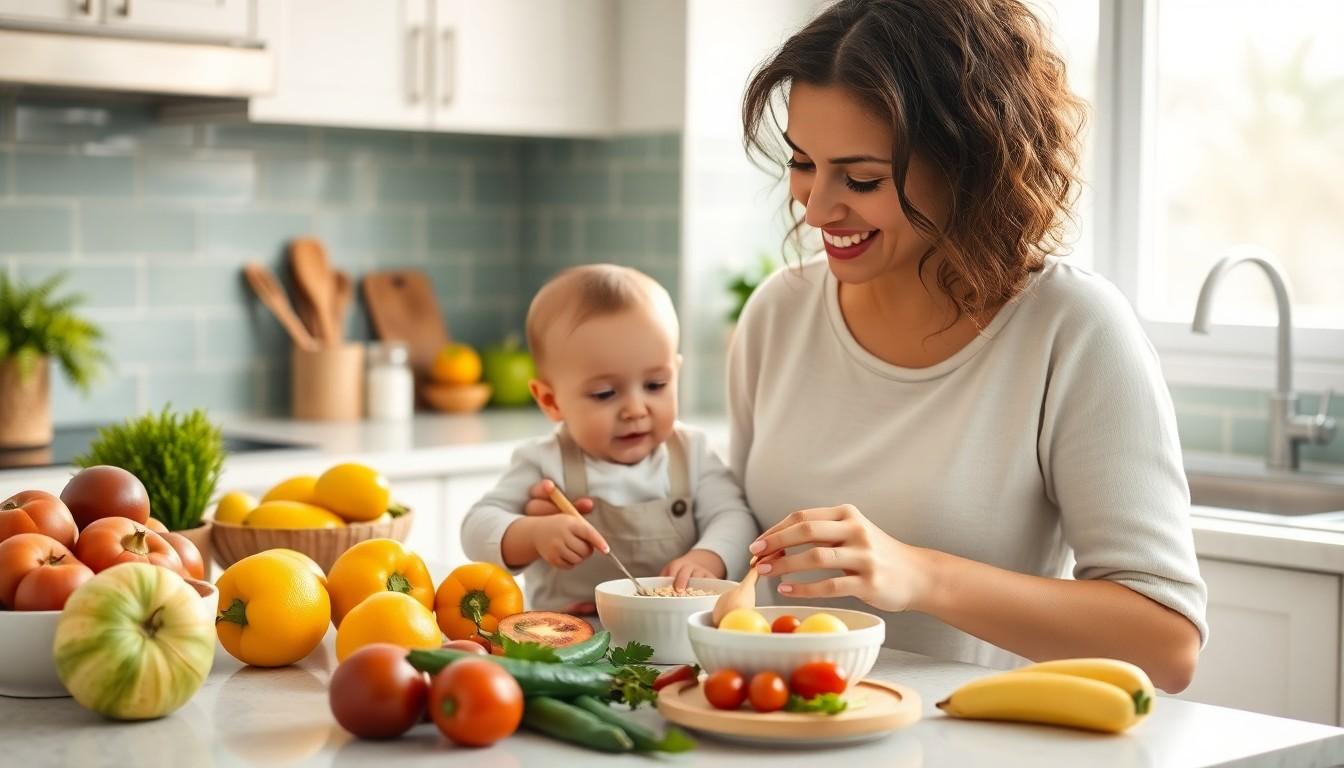When it comes to feeding an 8-month-old, the stakes are high. It’s not just about filling tiny tummies; it’s about laying the foundation for a lifetime of healthy eating habits. Homemade baby food offers a delicious way to introduce your little one to a world of flavors while ensuring they get all the nutrients they need. Plus, who wouldn’t want to whip up gourmet meals in their kitchen that would make even Gordon Ramsay raise an eyebrow?
Homemade Food for 8 Month Old Baby
Homemade food offers significant advantages for 8-month-old babies. Nutrient density ranks high among these benefits, as parents control ingredients and preparation methods. Fresh fruits and vegetables provide essential vitamins and minerals, supporting healthy growth and development.
Customization plays a crucial role. Parents can tailor recipes according to their baby’s taste preferences and dietary needs. Introducing a variety of flavors early on helps cultivate a diverse palate and fosters adventurous eating habits.
Safety also remains a primary concern. Homemade baby food allows parents to avoid preservatives and additives commonly found in commercial products. This ensures that meals remain wholesome and minimizes exposure to potentially harmful ingredients.
Affordability factors into the equation. Preparing meals at home typically costs less compared to buying pre-packaged baby food. Bulk purchasing ingredients further reduces expenses, making homemade options more budget-friendly.
Convenience cannot be overlooked. Parents can prepare larger batches of food and store portions for later use, streamlining mealtime routines. This approach saves time and enables quick, nutritious meals for their babies.
Moreover, cooking together can become a bonding experience for families. Engaging in food preparation fosters connections and creates lasting memories. Teaching children about healthy eating habits early sets a strong foundation for their lifelong relationship with food.
Combining these elements illustrates that homemade food not only satisfies hunger but also enhances a baby’s diet in multiple ways. Focusing on quality, safety, and family engagement elevates homemade meals above ready-made options, ensuring that babies receive the best start in their culinary journey.
Nutritional Needs For 8 Month Old Babies

At 8 months old, babies require a balanced mix of nutrients for growth and development. Proper nutrition supports physical development and cognitive growth, laying the foundation for healthy eating habits.
Key Nutrients To Focus On
Iron serves as a crucial nutrient for babies, promoting cognitive development and energy levels. Vitamin A supports vision and immune function, while vitamin C enhances iron absorption and boosts the immune system. Protein contributes to muscle development, aiding overall growth. Healthy fats, such as those in avocados and oils, support brain development. Fiber facilitates digestion and helps establish healthy eating patterns. Calcium is vital for bone health and development.
How Homemade Food Meets These Needs
Homemade food effectively meets these nutritional needs by allowing parents to select fresh, wholesome ingredients. Preparing meals with iron-rich foods, like lentils or meat, ensures babies receive essential nutrients. Including vegetables rich in vitamins A and C, like carrots or sweet potatoes, supports immune health. Parents can incorporate diverse proteins, such as beans and yogurt, into meals. Healthy fats can come from incorporating avocados or olive oil into homemade recipes. Additionally, making meals at home enables careful monitoring of ingredient choices, supporting optimal nutrition for the baby.
Best Homemade Food Recipes
Preparing homemade food for an 8-month-old baby offers numerous benefits, including nutritional control and customization. Here are several tasty options to consider.
Fruit Purees
Fruit purees provide a naturally sweet and nutritious option. Common choices include apples, bananas, and pears. Steaming fruit like apples before pureeing enhances texture and flavor. Using ripe bananas directly creates a smooth consistency. Mixing fruits, such as apple-pear or banana-mango, introduces diverse flavors. Avoid adding sugars or syrups, as natural sweetness suffices. Preparing small batches makes it easy to freeze and store for later use.
Vegetable Purees
Vegetable purees serve as an excellent source of vitamins and minerals. Carrots, peas, and sweet potatoes are popular for their nutritional benefits. Steaming vegetables retains essential nutrients while softening their texture. Sweet potatoes can be baked or boiled before mashing. Combining green peas with carrots yields a vibrant and nutritious blend. Experimenting with spices such as cinnamon or nutmeg can introduce new flavors. Freezing homemade purees in ice cube trays simplifies meal preparation.
Grain-Based Foods
Grain-based foods offer healthy carbohydrates for energy. Oatmeal and rice cereal are suitable starting points for babies. Cooking rice until soft provides a gentle texture that’s easy to swallow. Mixing ground oats with milk creates a creamy porridge. For added flavor, consider incorporating mashed bananas or fruit purees. Whole grain options foster a healthy digestive system and support overall growth. Regularly alternating grains encourages a varied diet, promoting adventurous eating.
Tips For Preparing Homemade Baby Food
Preparing homemade baby food requires attention to safety and storage practices. These steps ensure that the food remains nutritious and safe for the little ones.
Kitchen Safety Tips
Utilizing clean utensils and surfaces is crucial in preventing contamination. Always wash hands before handling food to minimize germs. Cook foods thoroughly to eliminate harmful bacteria, especially when preparing meats and eggs. Cooling cooked foods quickly prevents bacteria growth; placing them in shallow containers speeds this process. Discard any unused portions that have been left out at room temperature for more than two hours. Keeping baby food separate from other foods during preparation decreases the risk of cross-contamination.
Storage Methods
Using airtight containers preserves the freshness of homemade baby food. Glass jars or BPA-free plastic containers work well for storage. Freeze food in small portions for convenient thawing, which allows parents to prepare only what’s needed. Label each container with the date to track freshness and avoid using expired food. A freezer typically keeps baby food safe for up to three months, while refrigerated options last up to three days. Ensuring proper thawing in the refrigerator maintains food quality and safety.
Common Mistakes To Avoid
Preparing homemade food for an 8-month-old baby requires attention to detail. Parents often overlook the importance of texture, which can affect a baby’s ability to eat and enjoy meals. Choosing purees that are too thin may hinder a baby’s transitioning to solid foods.
Ignoring allergies can lead to adverse reactions. Common allergens like eggs, dairy, and nuts should be introduced gradually, watching for any signs of intolerance. Not waiting a few days after introducing a new food prevents parents from identifying any potential allergies.
Another frequent mistake involves flavor variety. Repeatedly offering the same foods may limit a baby’s palate development. Experimenting with various fruits, vegetables, and grains encourages a willingness to try new tastes.
Portion sizes matter as well. Offering too much food at once can overwhelm a baby. Small servings help gauge a baby’s appetite and interest, allowing for easy adjustments to meal plans.
Nutritional balance is crucial. Overlooking essential nutrients can impact a baby’s growth and development. Focusing on iron-rich foods and healthy fats supports cognitive and physical progress.
Storage mishaps can compromise food quality. Failing to label containers or using the wrong storage methods may lead to spoilage. Properly labeling and using appropriate containers aids in maintaining freshness.
Lastly, neglecting to involve babies during meal preparation can miss a bonding opportunity. Allowing them to see and smell different ingredients fosters a positive food environment. Involvement also piques their curiosity about food.
Nurture Healthy Eating Habits From the Start
Homemade food for an 8-month-old baby provides a wonderful opportunity for parents to nurture healthy eating habits from the start. By crafting meals at home, they can ensure their child receives essential nutrients while exploring a variety of flavors. This not only supports growth and development but also fosters a sense of adventure in their baby’s palate.
The process of making these meals can be both enjoyable and rewarding, creating lasting memories in the kitchen. With proper preparation and storage techniques, parents can easily provide nutritious, safe, and delicious options for their little ones. Embracing homemade baby food is a step toward establishing a lifelong love for healthy eating.

